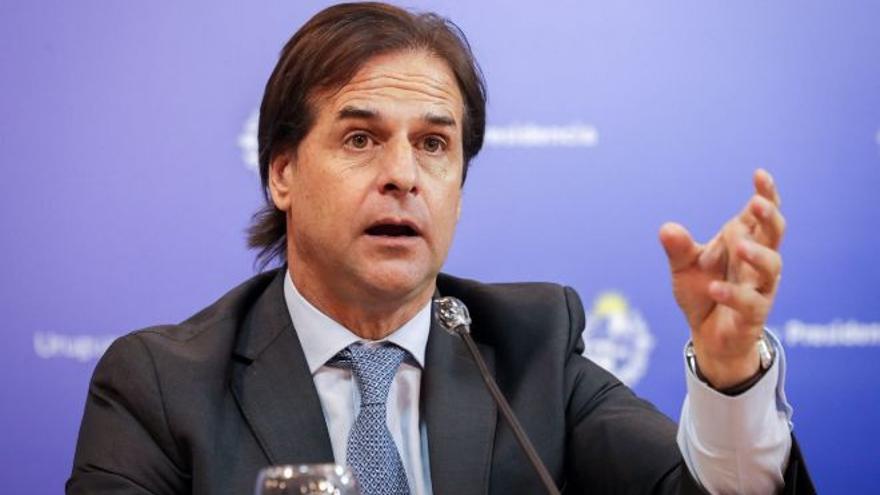
![]() 14ymedio, Havana, August 3, 2023 — The Center for the Opening and Development of Latin America (Cadal) sent a letter on Thursday to the President of Uruguay, Luis Lacalle Pou, requesting that he instruct his diplomats in Cuba to talk with the opposition to the island’s regime. The organization also urged the president to invite a “representative group of the opposition” to his Embassy in Havana, on the occasion of Uruguay’s national holiday, on August 25.
14ymedio, Havana, August 3, 2023 — The Center for the Opening and Development of Latin America (Cadal) sent a letter on Thursday to the President of Uruguay, Luis Lacalle Pou, requesting that he instruct his diplomats in Cuba to talk with the opposition to the island’s regime. The organization also urged the president to invite a “representative group of the opposition” to his Embassy in Havana, on the occasion of Uruguay’s national holiday, on August 25.
Gabriel C. Silva, international human rights activist and general director of Cadal, proposed to the Uruguayan Ministry of Foreign Affairs that its diplomats in Cuba maintain “regular contacts” with activists and opponents throughout the island, either at their homes or in agreed upon places.
The request, says the statement, is based on the principle of reciprocity between the two nations. “Taking into account the active and public relationship that the Cuban Embassy in Uruguay maintains with political leaders opposed to the Government of Lacalle Pou, it is therefore appropriate that the Oriental Republic of Uruguay also include the opposition in its relations and ties in Cuba,” wielded Cadal.
Although the Cuban State harasses and makes its opponents invisible, considering them “illegal,” it is not the role of a democratic country like Uruguay “to extend the illegality that the one-party regime imposes on them,” it added.
According to Cadal, this type of exchange would be beneficial to address the political reality of the Island without an ideological bias imposed by the official discourse. This is what, for example, the diplomatic corps of European countries “whose standards of democratic institutions are comparable to those of Uruguay” do.
Taking these States as a model, the organization asks Lacalle to receive opponents such as journalist Yoani Sánchez, political activist Manuel Cuesta Morúa and relatives of political prisoners at his Embassy in Cuba during Uruguay’s national holiday.
The Cuban Embassy in Uruguay carries out similar activities with opponents of the Lacalle government, according to the organization. On July 27, the Uruguayan Anti-Imperialist Committee of Solidarity with Cuba and the Peoples of the World invited politicians and union leaders belonging to the diplomatic corps accredited in the country, to celebrate the 70th anniversary of the attack on the Moncada barracks, in Santiago de Cuba.
Cuban diplomats also establish frequent contact with Uruguayan activists, politicians, parties and artists. For this reason, the statement concluded, “the Government of Cuba will have to accept – according to the principle of reciprocity – that the diplomats of the Embassy of the Oriental Republic of Uruguay in Havana maintain exchanges with leaders of the Cuban democratic opposition.”
Under the Lacalle government, Uruguay has been one of the countries that has most pointed out the lack of democracy and the violation of human rights by the regimes of Venezuela, Nicaragua and Cuba. Last January, during the VII Summit of the Community of Latin American and Caribbean States (Celac), the president asked that the event not be turned into a “club of ideological friends,” since the existence in the region of “ideological friends that do not respect democracy, institutions or human rights is clear.”
During the previous Summit, Lacalle himself starred in an altercation with the Cuban ruler Miguel Díaz-Canel by reciting a fragment of the song Patria y Vida, which became the anthem of the popular protests of July 2021.
More recently, on July 28, the Costa Rican Legislative Assembly approved a motion against the Cuban regime for the systematic violation of human rights and in favor of the release of more than a thousand political prisoners on the island. The proposal, presented by the Progressive Liberal Party (PLP), was approved with 34 deputies in favor and seven against.
Everything indicates that the regime’s efforts to launder its international image continue without bearing fruit when two of the best-established democracies in Latin America point to Cuba as a non-democratic government. Along with Chile, Uruguay and Costa Rica are two of the three full democracies in Latin America, according to the British magazine The Economist, which also included Venezuela, Nicaragua and Cuba in the list of countries with less democratic systems in the region at the beginning of 2023, placing them at the bottom of its ranking.
____________
COLLABORATE WITH OUR WORK: The 14ymedio team is committed to practicing serious journalism that reflects Cuba’s reality in all its depth. Thank you for joining us on this long journey. We invite you to continue supporting us by becoming a member of 14ymedio now. Together we can continue transforming journalism in Cuba.
